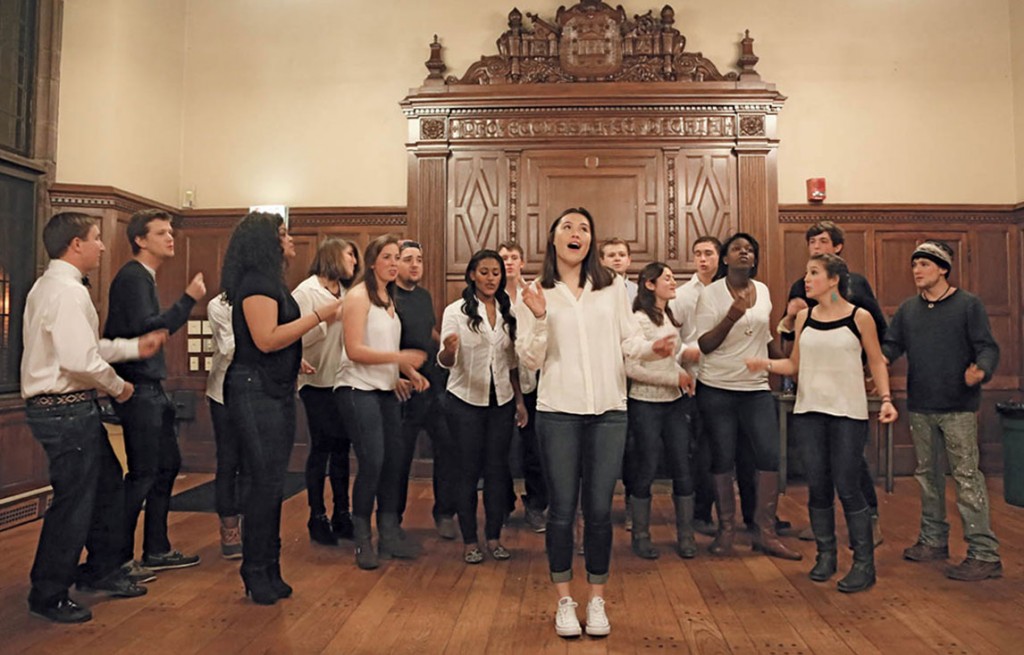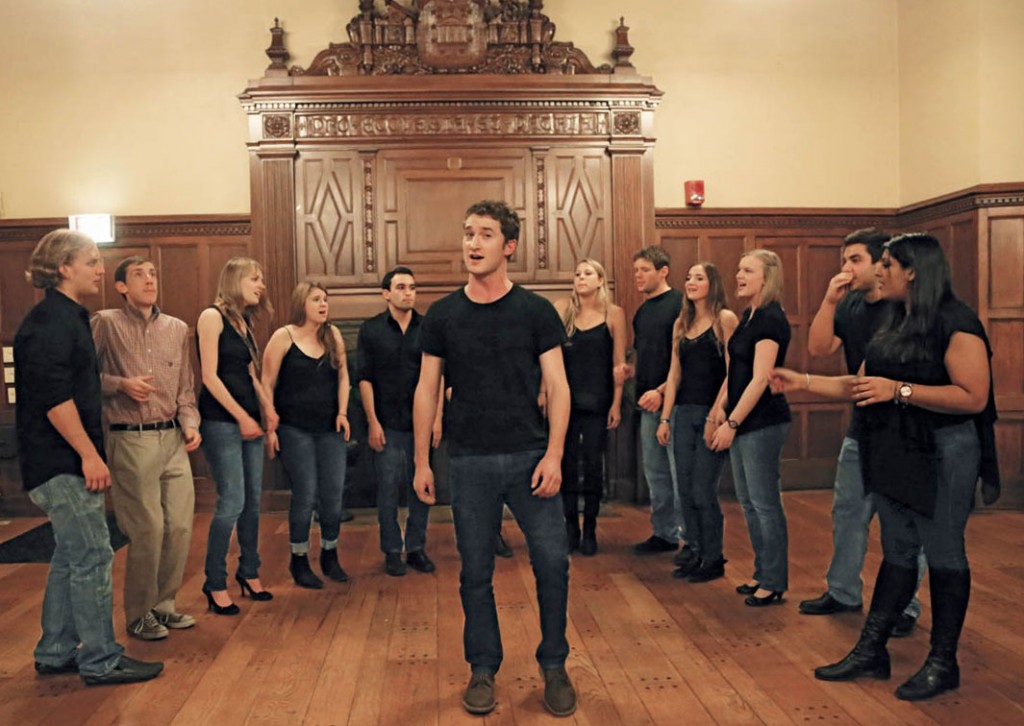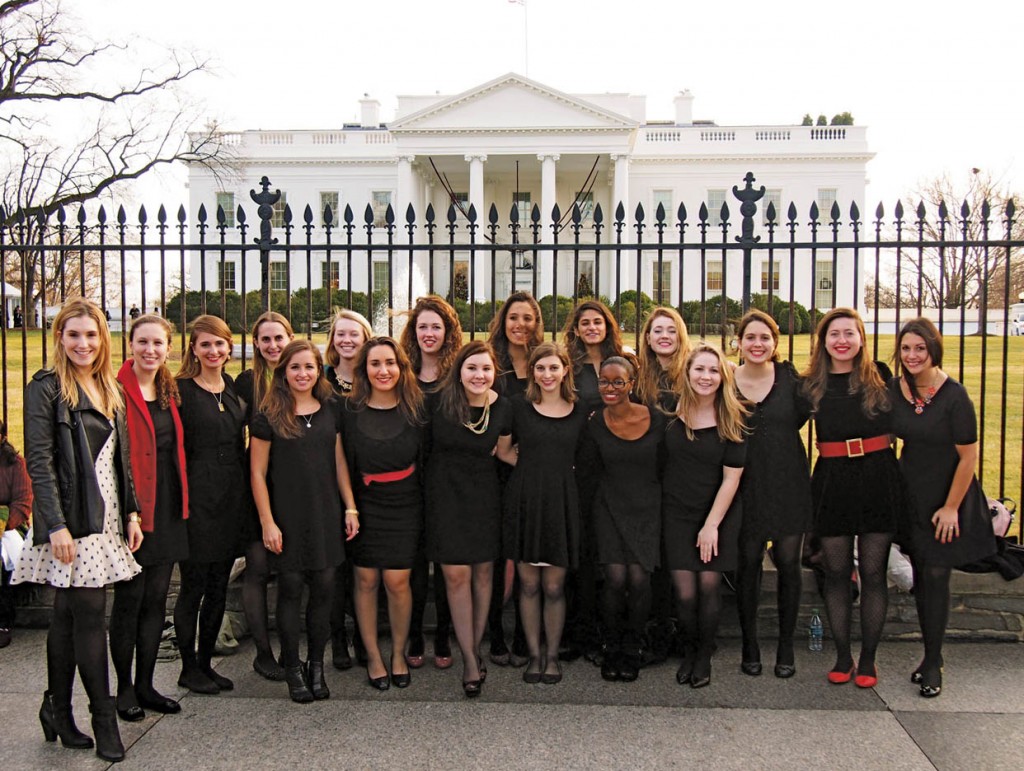A cappella singers share voices, sense of camaraderie
by Jim H. Smith
The last night of January is a Friday and cold. But when Jacqueline Busa ’17 arrives at Hamlin Hall just before 8:00, the ambient temperature is rising as swiftly as the seats disappear, and spirits are high despite the rather serious faces in the portraits of past presidents peering down from high on the walls. By the time the Accidentals, Trinity’s only all-male a cappella group, file in to kick the evening off a half an hour later, the room will be filled to capacity and the climate like that of a sauna.
It’s the night of spring-semester auditions for the College’s five a cappella groups, and Busa, a first-year student from Needham, Massachusetts, who is thinking about majoring in biochemistry, is there to try out for the Quirks, the all-women ensemble that became a Trinity institution 10 years ago and performed in December at the White House. Busa has been preparing for this since she was a kid. A lifelong vocalist, she was active in all sorts of singing ensembles throughout her childhood.
She thoroughly researched the College’s a cappella groups before she came to Hartford. Last September she tried out for the Pipes, the College’s oldest a cappella group, the Trinitones, and the Quirks. Though she was turned down by the Quirks, it was not for lack of talent. She was invited to try out again in January, and, though she admits feeling nervous, she’s also excited.
Revival
A cappella ensemble singing was part of the American collegiate cultural landscape for most of the 20th century. Rensselaer Polytechnic Institute’s Rensselyrics are descended from that institution’s longstanding glee club, founded in the 19th century, and Yale’s renowned Whiffenpoofs have been entertaining continuously since 1909.
But the phenomenon didn’t catch on at most colleges until around 1940. Princeton, Dartmouth, Harvard, Brown, and Cornell all had groups by 1950. Trinity’s first a cappella group, the Pipes, was already several years old by then. It originated as a male quartet in 1938 and later evolved into a small male choir, then a folk band, before becoming an a cappella group. The Pipes went coed when the College did, in 1970.
They remained Trinity’s only a cappella group until 1987, when the all-female Trinitones were founded. The Accidentals came along about six years later, followed by the Quirks and the coed Dischords in 2004 and 2005, respectively.
The five groups boast a combined 75 members, enjoying tremendous popularity and attracting large crowds whenever they perform on campus, as they always do on the audition nights at the beginning of each semester.
“There’s been a real revival of a cappella singing,” says John Rose, College organist and Chapel music director, who is the longtime faculty adviser to the Accidentals. “It has become more and more popular in the past few years as it has evolved to embrace modern pop music.”
Beyond a blending of voices
Unquestionably the adoption of contemporary tunes as part of the repertoire is one reason why collegiate a cappella is so popular. But there are others, says William “Mac” McCarthy ’14, a chemistry and Russian double major and a Jill G. and Peter S. Kraus ’74 Presidential Scholar. His sister Caitlin McCarthy ’06 sang with the Pipes while she was at Trinity.
“I’ve always been a singer,” he says. “The Accidentals have made it possible for me to do that all the time that I’ve been an undergraduate. I’ve had opportunities to write and arrange music, and we get to travel a lot. We perform at alumni events, private events, festivals.”
Perhaps the most important reason for a cappella’s popularity among its members, however, is one less apparent to audiences. “The Accidentals are more than just an a cappella group,” McCarthy says. “It’s a brotherhood. The members of the group are all my best friends.”
Rachael Burke ’14, a member of the Quirks throughout her four years at Trinity, agrees. “A cappella is a wonderful way to meet people at Trinity,” she says. “As a first year, I had an immediate support group when I joined the Quirks. The members have a shared interest. Everyone is highly motivated, and they really care about each other.”
Like any successful team, the members understand the success of the unit is paramount. They commit to not only share the fun but also the hard work, which includes one or two hours of practice several nights each week. The rehearsals are obligatory, but the singers appreciate what they gain.
A “second family” is how Jessica L’Heureux ’14 describes what the Pipes mean to her. “The group succeeds when its members work together toward mutual goals,” says L’Heureux, a Charles Byron and Ila Bassett Spofford Scholar. It’s a commitment that endures beyond the college years. “When we had our 75th anniversary last year, 75 alumni came to Hartford to celebrate.”
Others point to more positive benefits of being a part of a group. “Singing a cappella is a lot of work, but the rewards are very great,” says Anisha Chakrabarti ’14 of the Dischords. “The academic work at Trinity can be very demanding. Practicing with the Dischords helps to balance that. It’s a real outlet, and there’s a lot of emotional support from all of the members.”
Posse Scholar Madeleine “Maddie” Dickinson ’14 of the Trinitones says, “I was very committed to my academic work when I came to Trinity. I had made a personal promise not to overextend myself with extracurricular activities. But I found a support group and structure in the Trinitones. It has been an entirely positive experience.”
A lens
Lasting friendships. Joyful memories. A commitment to hard work and self-discipline. Those are the gifts of a cappella that the singers take with them when they leave Trinity. “Founding the Quirks is the Trinity accomplishment of which I’m most proud,” says Brie Schwartz ’06, who, with Anna Vognsen ’06, launched the group in 2004. “It demanded both leadership and teamwork, and it unquestionably enhanced my College experience.”
“A cappella was a lens through which I viewed all of my College experience,” says the Rev. Gideon Pollach ’96, head chaplain at Episcopal High School in Alexandria, Virginia, and a founder of the Accidentals. “The friendships are still strong. I’m still in touch with many of the members.”
Last December, when the Quirks were invited to the White House, Schwartz and Vognsen accompanied them. “We’re honored and thrilled,” Vognsen said at the time. “We’re so proud of everything they’ve done and very excited to be there.”
Performing at the White House was the frosting on two years of special events during which the Quirks have sung at the opening of a Boston Red Sox game, joined the Yale Whiffenpoofs for shows at Norfolk, Connecticut’s celebrated Infinity Hall, and competed against the nation’s top a cappella groups at the Silver Chord Bowl.
But they don’t rest on laurels. None of the groups do. To watch them “sell it” to their fellow students on the cold Friday evening in January, one might conclude this is the summit of their season. Each group arrives and leaves to robust applause that rings in the high, vaulted rafters.
When the sweet harmony ends and the crowd empties out into the frosty air, the five groups spread out across campus to conduct their auditions. Jacqueline Busa is one of 10 young women who try out with the Quirks. She performs her rendition of Adele’s “Turning Tables,” and it’s sufficiently compelling to earn a callback invitation to work out with the group the next day.
Sunday evening she learns she has been selected. Two weeks later, when she performs her first concert with the group, she already feels at home. “Once a Quirk,” she says, “always a Quirk.”
The Accidentals:
For more information of the Accidentals, visit: www.trinityaccidentals.com
The Dischords:
For more on the Dischords, visit: http://trinitycollegedischords.weebly.com
The Pipes:
For more information on the Pipes, visit: https://www.facebook.com/thetrinitypipes
The Quirks:
The Quirks – Take Me Home
For more information on the Quirks, visit: www.trinitycollegequirks.com
The Trinitones:
The Trinitones – Butterfly
For more information on the Trinitones, visit: www.trinitytrinitones.weebly.com





